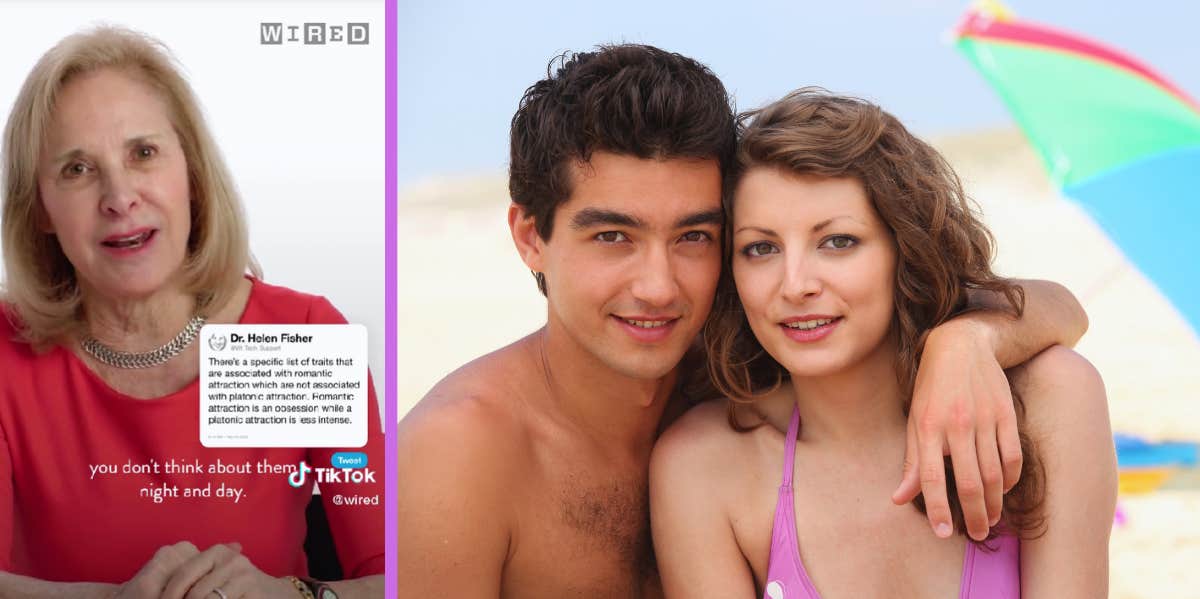How To Tell If Your Feelings Are Romantic Or Platonic
The distinction between these two types of attraction can change everything. Dr. Helen Fisher shares a few tips.
 @Wired.com - TikTok / Phovoir - Shutterstock
@Wired.com - TikTok / Phovoir - Shutterstock Many of us dream of that whirlwind romance where we get swept off our feet and live ‘happily ever after’. But not every important relationship in your life will be romantic. Many will turn out to be platonic love, which is just as profound, but in a different way.
So, how do you know if the feelings you have for that special someone are romantic or platonic? Dr. Helen Fisher, a biological anthropologist, shared her views in a on distinguishing one from the other in a TikTok video uploaded by “Wired.com”.
Dr. Fisher starts by telling viewers, “There’s a literal list of traits that are associated with feelings of romantic love and they are not associated with platonic attraction.”
Are my feelings romantic or platonic?
According to her, when people fall in love, the person they are attracted to takes on a special meaning. Even the most minute of things like the car they drive, the house that they live in, the street that they live on, and the music they like stand out from all the others.
When it comes to platonic attraction, you like someone, but you don’t necessarily find everything they do and possess unique and special. “You’ll find them amusing or funny or interesting, but you’re not obsessed with them,” said Dr. Fisher.
But the one trait that separates platonic love from romantic love is that obsession, Dr. Fisher mentioned. You think about your person night and day, whereas platonic feelings for someone doesn’t inspire the same obsessive thoughts.
RELATED: The Key Ingredient For Romantic Connection — According To Science
The complexity of attraction
Attraction is complicated. But it is also something that most human beings will experience in their lifetime. It can be shown and given in many different ways. It’s a sense of closeness, interest, or desire you feel toward someone. It’s mostly used in a sexual or romantic context but is not restricted to those categories.
There are several different types of attraction.
The most familiar type of attraction is sexual, and it can be subjective, where you are aroused by a person’s presence, or objective where you are not necessarily aroused, but know that most people find them sexually attractive. This form of attraction is rooted in lust. But you can also be aesthetically attracted—you admire a person’s physical attributes but have no sexual desire toward them.
Then there is physical attraction in which you want to have contact with someone, but not in a sexual or romantic context. You want closeness and intimacy, but not sex. Similarly, emotional attraction is a desire for proximity to a person, but it may not include actually touching them. You might like their intellect or their thought process and feel bonded to them. These are types of platonic attraction.
Romantic attraction, the type most are familiar with involves a combination of emotional, physical, and sexual intentions toward someone. You want to be in a romantic relationship with them and imagine you two getting together as a couple.
Feelings can change over time, shitfing from platonic to romantic
How you feel about someone influences how you treat them, behave around them, and make decisions involving them. If you are physically attracted to a person, you might have more positive expectations for their personality and behavior. This could lead to the ‘halo’ effect where they can do no wrong in your eyes because you see them through rose-colored glasses.
But if that same person does something to turn you off romantically, you can easily move them to your ‘friend zone’ and that attraction can switch to a platonic one in the blink of an eye.
Attractions can be confusing due to their complexity. Make sure you know what your romantic and platonic preferences are, so you make clear choices and prioritize appropriately. Be self-aware and maintain your boundaries. Don’t settle for anything less than you deserve.
Dr. Fisher posed the question “Can romantic love last?” in one of the articles she wrote. Surprisingly, she found that romantic love can be sustained, but the attraction will evolve and grow as time passes. But it starts in the brain and is dependent on each person maintaining the “positive illusions” they have about their mate for the entirety of the relationship.
Be careful not to overlook the power of platonic love. It, too, is the basis for some of the most meaningful relationships you will have in your life time. Those heartfelt connections, the intimacy, and the care give way to deep bonds that can sustain over a lifetime.
NyRee Ausler is a writer from Seattle, Washington who specializes in content self-love, interpersonal relationships, and lifestyle topics. She strives to deliver informative and entertaining news you can use to help navigate life.

